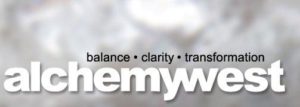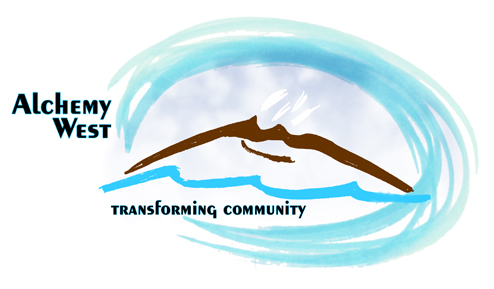 The lure of immortality dances through our lives, weaving delicate patterns that tease us with the possibility.
The lure of immortality dances through our lives, weaving delicate patterns that tease us with the possibility.
To live forever.
And then, of course, we don’t.
Honestly, I never expected to live forever. You’re born, crap happens, fun happens, you die. Nope, I never expected to live forever, and I didn’t, either: last February I died of the flu, and, sure, I obviously came back, but I still died. At home in bed with my kids: my dogs, Murphy and Alki, and Grace the Cat.
I never thought Murphy would live forever. My dog. My eldest. She had so many things go wrong early in her life, we were surprised she made it to 3 and celebrated when she hit 5.
Today, January 16, 2012, she is 13-1/2. She’s been healthy and vigorous since she was 5. Mostly. There’s arthritis, things like that.
But to think of “Murphy” and “old age” astonishes me. I’m still more astonished that, somewhere along the way, deep down inside, I thought she would live forever. What an idiot I can be.
I just never expected it: either Murphy’s old age or, then, Murphy dying. I should know better, since I was only 9 when the first person I thought was immortal died, and I’ve lost many people and several animals since then. But somehow I just assumed that Murphy would skip that phase.
And now in the last few weeks I’ve learned that she is dying. Purely by accident, since I am the super careful slightly neurotic overly analytical intuitive, we discovered that she has a tumor on her spleen.
Murphy is dying.
Somewhere in the last few days I decided to record our last journey together, from the shock of discovery to the agony of choice to the stupid things you think of when someone you love is dying. A running journal. The story of almost immortal.
I know how it’s going to end. I don’t know when. I only know it happens a little bit with every breath I take, I can feel it.
 The human-animal bond is a strange and wonderful thing. Living a multi-species family life is both inspiring and terrifying: every day you should be realizing that it’s one less day, not one more, but you don’t. You can’t.
The human-animal bond is a strange and wonderful thing. Living a multi-species family life is both inspiring and terrifying: every day you should be realizing that it’s one less day, not one more, but you don’t. You can’t.
Living an intuitive life where you know that all life is equal is also a strange and wonderful thing. You learn about choice, about individual choice, and family choice, and community choice. It’s beautiful. Terrifying. Absurd.
Real life is about choice. Crappy choices are part of it. How do you live, and die? What does it look like? Why should we share it? What can it mean for our lives in community, for our lives as humans with animals, and homes, and businesses, all wrapped up in the mystery of nature and of the planet itself?
What happens when someone you love is dying?
Once again, I’m going to find out. Write about it. Maybe see what you think.
Will it be cathartic? Maybe. Angry? You bet. Resigned? Never. Goofy and absurd? Most likely. True? Every single word.
Even in my most optimistic moments I can’t see anything positive coming from this, because at the end Murphy will be gone.
But something is coming.
We shall see.
© 2011 Robyn M Fritz
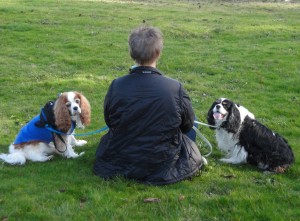 Every January people think about New Year’s resolutions. I never did get that, maybe because I think of life as a choice, and I’m glad I get them.
Every January people think about New Year’s resolutions. I never did get that, maybe because I think of life as a choice, and I’m glad I get them. 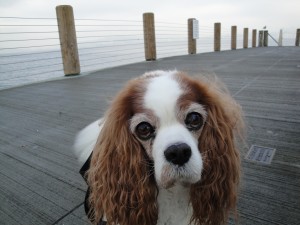 But we now know that Murphy’s journey is ending. She has a tumor on her spleen, and there are no easy choices. Remove her spleen and she may live, a few weeks or years, we don’t know. But if it’s a bruise or a tumor that is the spleen’s own way of dealing with a lifelong platelet disorder, maybe, just maybe, surgery is not the answer. And right now it isn’t, anyway, because this all started because she had a mild cough and UTI, and she has an infection to beat first.
But we now know that Murphy’s journey is ending. She has a tumor on her spleen, and there are no easy choices. Remove her spleen and she may live, a few weeks or years, we don’t know. But if it’s a bruise or a tumor that is the spleen’s own way of dealing with a lifelong platelet disorder, maybe, just maybe, surgery is not the answer. And right now it isn’t, anyway, because this all started because she had a mild cough and UTI, and she has an infection to beat first. 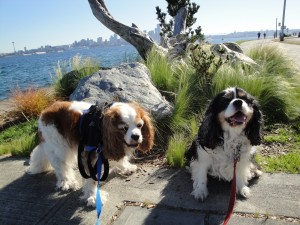 When you live the human-animal bond, you celebrate birthdays with your multi-species family.
When you live the human-animal bond, you celebrate birthdays with your multi-species family.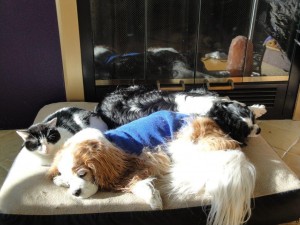 I awaken in the night and hear it. Silence. I wait for more. It comes. I smile.
I awaken in the night and hear it. Silence. I wait for more. It comes. I smile.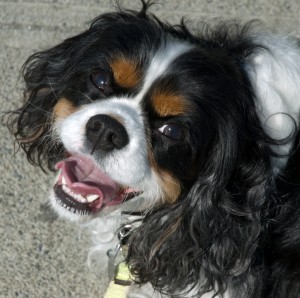 Living with anyone, especially yourself, can be irritating. You have grand illusions about being saintly, or at least perfect, but reality doesn’t seem to work like that.
Living with anyone, especially yourself, can be irritating. You have grand illusions about being saintly, or at least perfect, but reality doesn’t seem to work like that.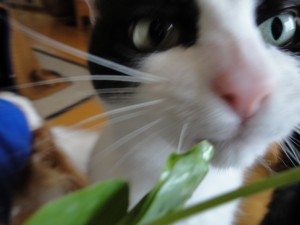 Cooking is a skill I apparently lost with menopause—and only miss when I’m hungry.
Cooking is a skill I apparently lost with menopause—and only miss when I’m hungry.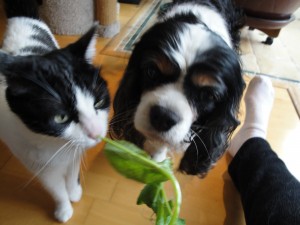 Take, for example, pea shoots. I love pea shoots. I have no idea what they are, except pea shoots, but we love them at our house, all of us, even the cat. We’re even doing a video starring pea shoots. Now, the dogs always come running when I come through the door with food, but if I say, “Pea shoots!” then Grace the Cat leaps up from her normal out cold snooze and races to hold down the kitchen counter while supervising grocery unloading.
Take, for example, pea shoots. I love pea shoots. I have no idea what they are, except pea shoots, but we love them at our house, all of us, even the cat. We’re even doing a video starring pea shoots. Now, the dogs always come running when I come through the door with food, but if I say, “Pea shoots!” then Grace the Cat leaps up from her normal out cold snooze and races to hold down the kitchen counter while supervising grocery unloading.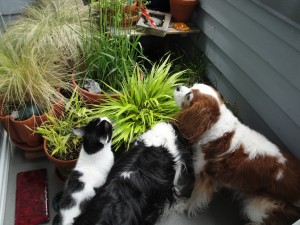 So now I’m a reformed shopper at the West Seattle Farmers’ Market. The vendors tend to explain things to me as they’re putting them in my bag: this is pea shoots, this is spinach, whatever. People in line shake their heads and sigh. But at least I get home safely. With food we kind of know how to eat.
So now I’m a reformed shopper at the West Seattle Farmers’ Market. The vendors tend to explain things to me as they’re putting them in my bag: this is pea shoots, this is spinach, whatever. People in line shake their heads and sigh. But at least I get home safely. With food we kind of know how to eat.  Here I’d been thinking I was just a bit off. And, as usual, not regretting it a bit.
Here I’d been thinking I was just a bit off. And, as usual, not regretting it a bit. And the condo? I love our condo. My multi-species family loves it. I planned for it to be a place where kids and dogs could come and go while enjoying the beach in our salty, sandy Seattle beach neighborhood. It worked really well for that. What I didn’t count on was the most obvious of all—my animals would age.
And the condo? I love our condo. My multi-species family loves it. I planned for it to be a place where kids and dogs could come and go while enjoying the beach in our salty, sandy Seattle beach neighborhood. It worked really well for that. What I didn’t count on was the most obvious of all—my animals would age. I was out with the dogs, scooping poop as we meandered down the street.
I was out with the dogs, scooping poop as we meandered down the street.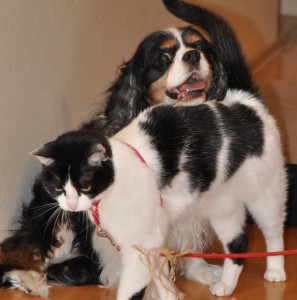
 We were afraid for awhile, but ultimately we chose love in our multi-species family. Alki chose love.
We were afraid for awhile, but ultimately we chose love in our multi-species family. Alki chose love.